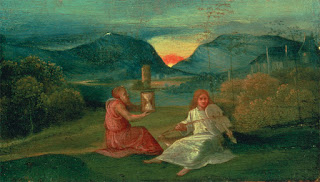 |
| Johnstown Flood May 31, 1889 |
FOREBODING sudden of untoward change,
A tight'ning clasp on everything held dear,
A moan of waters wild and strange,
A whelming horror near;
And midst the thund’rous din a voice of doom,—
"Make way for me, O Life, for Death make room!
"I come like the whirlwind rude,
'Gainst all thou hast cherished warring;
I come like the flaming flood
From a crater's mouth outpouring;
I come like the avalanche gliding free—
And the Power that sent thee forth, sends me!
"Where thou hast builded with strength secure
My hand shall spread disaster;
Where thou hast barr'd me, with forethought sure,
Shall ruin flow the faster;
I come to gather where thou hast sowed,—
But I claim of thee nothing thou hast not owed!
"O Life, from the fire-swept mould
Arise new forms of beauty;
Out of the waters cold
Diviner thoughts of duty;
The sunlight gleams where hath swept the tide,
And flowers blossom as flames subside!
"On my mission of mercy forth I go
Where the Lord of Being sends me;
His will is the only will I know,
And my strength is the strength He lends me;
Thy loved ones I hide 'neath my waters dim,—
But I cannot take them away from Him!"
"By the Conemaugh" by Florence Earle Coates. Published in The American (22 June 1889)—as rendered above—and in Poems (1898). The fourth stanza is omitted from the 1898 and subsequent versions.








